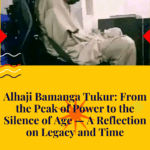In what many are calling a bold cultural statement, Ghana has officially adopted the traditional Kente attire for judges and lawyers, replacing the colonial-era English wigs and gowns that have long symbolized the legal profession in most Commonwealth countries, including Nigeria.
This development has stirred widespread conversations across West Africa — with many Nigerians reacting strongly, saying Ghana has once again taken the lead where Nigeria has hesitated.
The move comes shortly after Burkina Faso made a similar change, ditching the outdated colonial dress code in favor of attire that represents African identity and heritage. Ghana’s decision is now seen as another significant step toward decolonizing the justice system and promoting cultural pride.
Judges and lawyers in Ghana will now appear in beautifully woven Kente fabrics — a symbol of African royalty, dignity, and unity. The adoption is not just about fashion; it’s about reclaiming identity and rejecting a system that for decades reflected the influence of colonial rule.
For many Nigerians, the news feels like a wake-up call.
While Ghana and Burkina Faso are proudly showcasing their heritage, Nigeria still holds on tightly to the British-style wigs and robes introduced during colonial times — symbols that, some argue, no longer represent who we are as a people.
Commentators on social media have described Ghana’s action as both inspiring and embarrassing for Nigeria, sparking debates about why the giant of Africa is slow to embrace its own identity in national institutions.
The choice of Kente goes beyond aesthetics.
It represents African pride, a deep sense of belonging, and a rejection of the notion that professionalism must always wear a Western face. By incorporating traditional attire into its legal system, Ghana is not just changing how its courts look — it’s changing what they stand for.
At FaceToface TV, we believe this bold cultural shift by Ghana is worth celebrating and emulating.
It challenges Nigeria and other African nations to reflect deeply on what true independence really means.
Is it merely political, or should it also extend to our symbols, institutions, and identity?
What’s your take on this?
Should Nigeria follow Ghana’s lead and embrace traditional attire in its courtrooms, or should we maintain the colonial wigs and robes in the name of “professional tradition”?
Drop your thoughts in the comment section below. 👇



